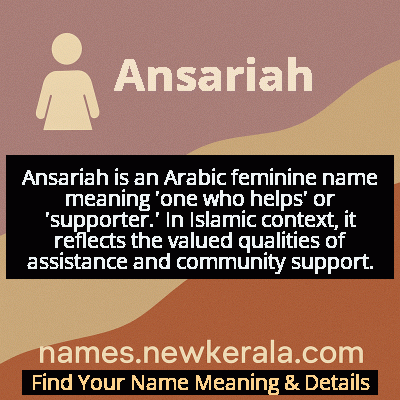Ansariah Name Meaning & Details
Origin, Popularity, Numerology Analysis & Name Meaning of Ansariah
Discover the origin, meaning, and cultural significance of the name ANSARIAH. Delve into its historical roots and explore the lasting impact it has had on communities and traditions.
Name
Ansariah
Gender
Female
Origin
Muslim
Lucky Number
8
Meaning of the Name - Ansariah
Ansariah is an Arabic feminine name meaning 'one who helps' or 'supporter.' In Islamic context, it reflects the valued qualities of assistance and community support.
Ansariah - Complete Numerology Analysis
Your Numerology Number
Based on Pythagorean Numerology System
Ruling Planet
Saturn
Positive Nature
Ambitious, efficient, realistic, and authoritative.
Negative Traits
Materialistic, stressed, confrontational, and can be overly ambitious.
Lucky Colours
Dark blue, black.
Lucky Days
Saturday.
Lucky Stones
Blue sapphire, amethyst.
Harmony Numbers
2, 4, 6.
Best Suited Professions
Business leaders, managers, financial services, law enforcement.
What People Like About You
Leadership, determination, organizational skills.
Famous People Named Ansariah
Ansariah bint Abdullah
Early Islamic Scholar
Known for her knowledge of Hadith and contributions to early Islamic education
Ansariah al-Misriyah
Philanthropist
Established charitable foundations for women's education in Egypt
Ansariah Khan
Social Reformer
Pioneered women's welfare programs in South Asian Muslim communities
Name Variations & International Equivalents
Click on blue names to explore their detailed meanings. Gray names with will be available soon.
Cultural & Historical Significance
The cultural importance of Ansariah extends beyond its literal meaning to encompass broader Islamic values of social responsibility and community welfare. In various Muslim cultures, the name is often chosen by families who value education, social service, and community leadership for their daughters. Historical records show women named Ansariah playing significant roles in early Islamic education, charitable work, and community organization. The name continues to represent the ideal of the supportive Muslim woman who contributes positively to her society while maintaining strong faith and cultural identity.
Extended Personality Analysis
Women named Ansariah are typically perceived as naturally helpful, compassionate individuals with strong nurturing instincts. They often exhibit excellent interpersonal skills and a genuine desire to support others in both personal and professional contexts. These individuals tend to be reliable team players who thrive in collaborative environments where they can contribute to collective success. Their helping nature extends beyond mere assistance to include emotional support, practical problem-solving, and community building.
Ansariahs are often described as having warm, approachable personalities that make others feel comfortable seeking their guidance and support. They typically possess strong organizational abilities combined with empathetic understanding, making them effective in caregiving roles, education, social work, and community leadership positions. Their natural inclination toward helping others is balanced by practical wisdom, allowing them to provide meaningful assistance rather than mere sympathy. Many Ansariahs develop strong conflict resolution skills and become trusted mediators in their social and professional circles, embodying the name's meaning through their daily interactions and life choices.
Modern Usage & Popularity
In contemporary times, Ansariah maintains steady usage within Muslim communities worldwide, particularly among families seeking names with strong Islamic heritage and meaningful connotations. While not among the most popular names, it enjoys consistent appreciation for its beautiful meaning and cultural resonance. The name sees moderate usage in countries with significant Muslim populations including Indonesia, Pakistan, Egypt, and Turkey, as well as among Muslim diaspora communities in Western nations. Modern parents often choose this name to instill values of community service and helpfulness in their daughters. Recent years have seen a slight increase in its usage as Muslim families increasingly seek names that combine traditional meaning with distinctive character, moving away from extremely common names while maintaining cultural and religious significance.
Symbolic & Spiritual Meanings
Symbolically, Ansariah represents the embodiment of support, assistance, and community solidarity. It carries connotations of being a pillar of strength for others, a source of reliable help in times of need, and a unifying force within social structures. The name metaphorically suggests someone who bridges gaps, heals divisions, and strengthens communal bonds through their supportive nature. It symbolizes the Islamic principle of mutual responsibility and the importance of being there for one another. In a broader sense, Ansariah represents the human capacity for empathy and the transformative power of helping hands in building stronger, more compassionate societies. The name evokes images of reliability, trustworthiness, and the quiet strength that comes from genuine concern for others' wellbeing.

